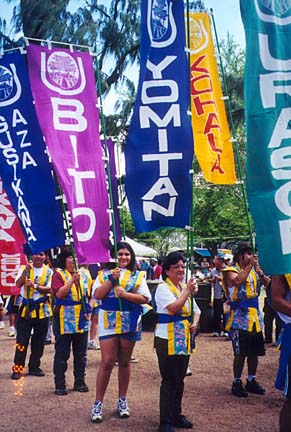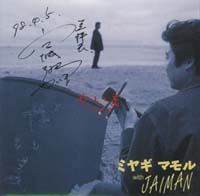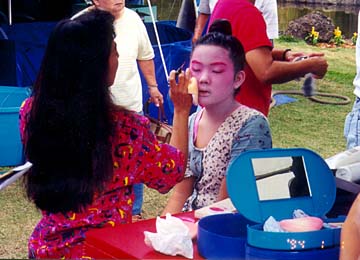


THEIR LANGUAGES are different but Hawaiians and Okinawans have some shared experiences. Both island nations were occupied and annexed by foreign powers -- Hawaii by the United States in 1898 and Okinawa by Japan in 1879. Hawaiians and Okinawans alike have struggled since then to preserve their cultural traditions even as the dominant culture has tried at times to weaken or eliminate them. Okinawan music
plays on at festivalBy John Berger
jberger@starbulletin.com

And both groups have been increasingly active in working to keep their musical traditions alive and moving forward as living art forms.
With food, cooking demonstratons, crafts and music Okinawan Festival
Where: Kapiolani Park
When: 9 a.m. to 9 p.m. Saturday, and 9 a.m. to 5 p.m. Sunday
Admission: Free
Okinawa artists such as Shokichi Kina, the Rinken Band, Hidekatsu, Asamu Asato and Takashi Hirayasu have sought to respect tradition while simultaneously incorporating other types of music -- rock, reggae, African and Indian. Sometimes they rework traditional Okinawan songs by using contemporary rhythms in arrangements that use Western instruments as well as traditional Okinawan instruments such as the sanshin (a small three-stringed instrument), the kutu (a 13-string zither that is traditionally played by women), and paranku and odaiko drums.
Mamoru Miyagi brings his style of modern Okinawan music to Honolulu this weekend as part of the annual Okinawan Festival. He'll play the Kapiolani Park Bandstand at 12:30 p.m. tomorrow and Sunday.

Miyagi hails from a small island the locals call Yaima, where they speak a dialect that most other Okinawans don't understand. (Other Okinawans call the island Yaeyama; so do the Japanese.)"Yaima" is also the name of the song that has become Miyagi's musical signature. It is also the title of his debut album which he recorded in 1998 with a group called Jaiman. Miyagi and Jaiman utilized the sanshin as well as piano, bass, guitars, and an assortment of electronic keyboards to create non-traditional Okinawan music. (Copies of "Yaima" will be available at the festival.)
Music started as his hobby. He wrote songs in his native Yaima dialect and in Uchinaaguchi (the main form of the Okinawan language) while working as a "salary man" in Naha, the Okinawan capitol. He wrote "Yaima" almost 10 years ago when his father was ill; it spoke of his love for his family, the beauty of the island and his sadness at not being able to be there to help his mother.
Miyagi's career took off after the album was released in 1998. Japan airlines selected the title song to advertise its flights to Okinawa's neighbor islands, and his career got another boost when a Japanese singing star recorded two of his songs.
Miyagi's days as a "salary man" are now behind him. When not performing, writing or recording he enjoys visiting schools and teaching children to play the sanshin.
Click for online
calendars and events.